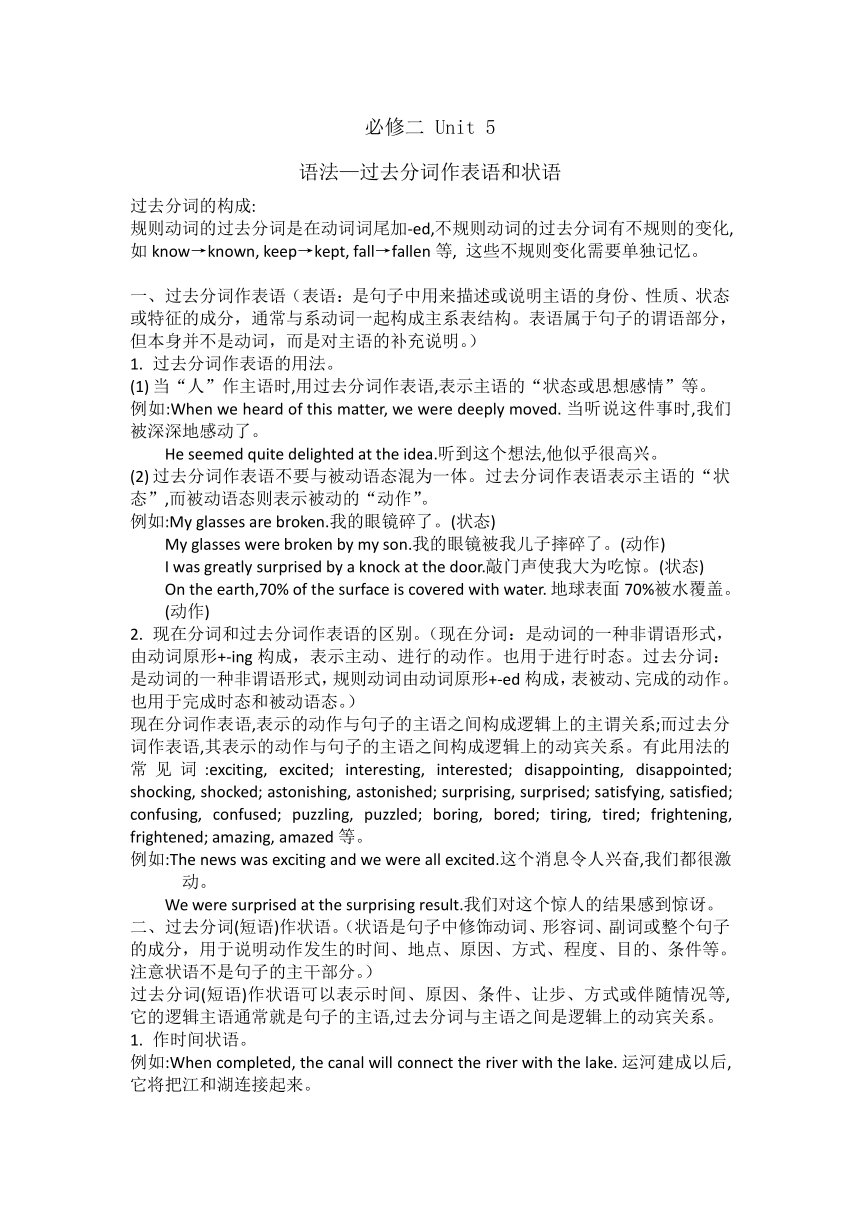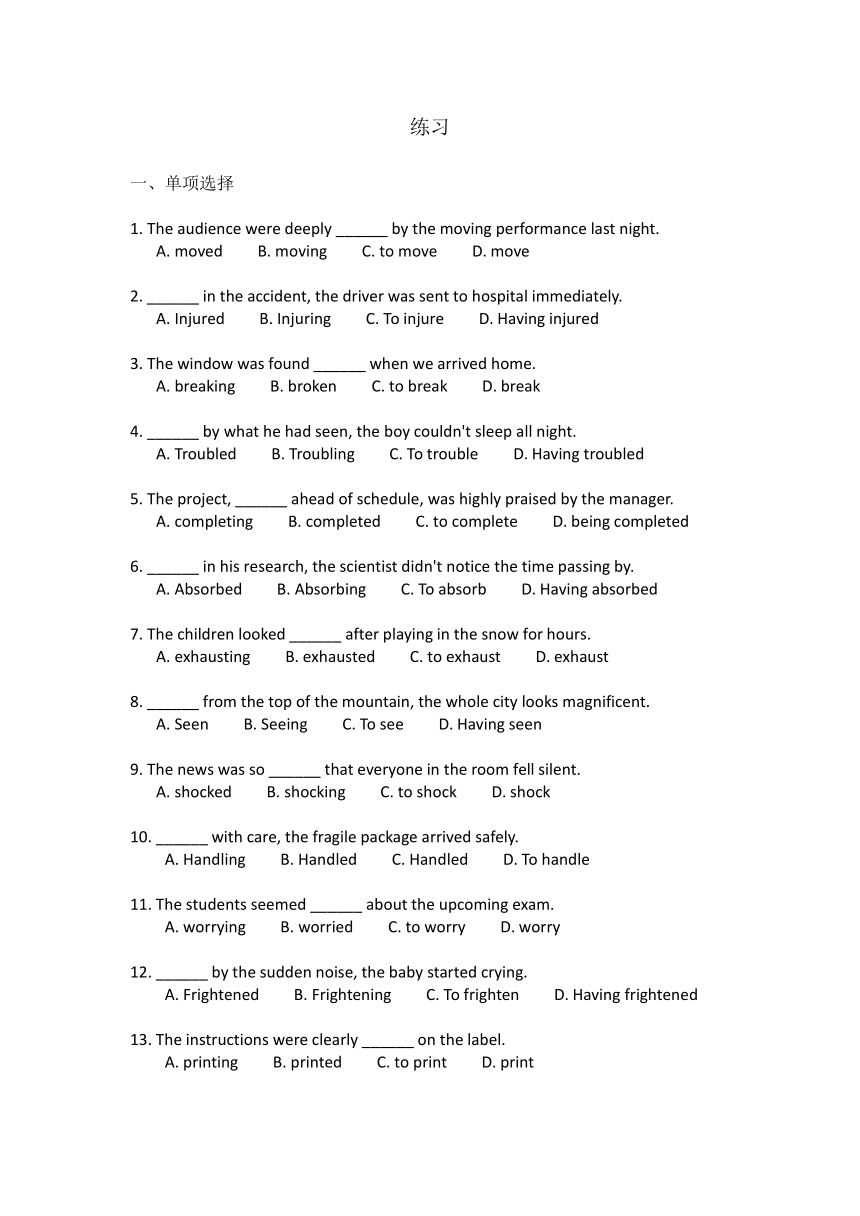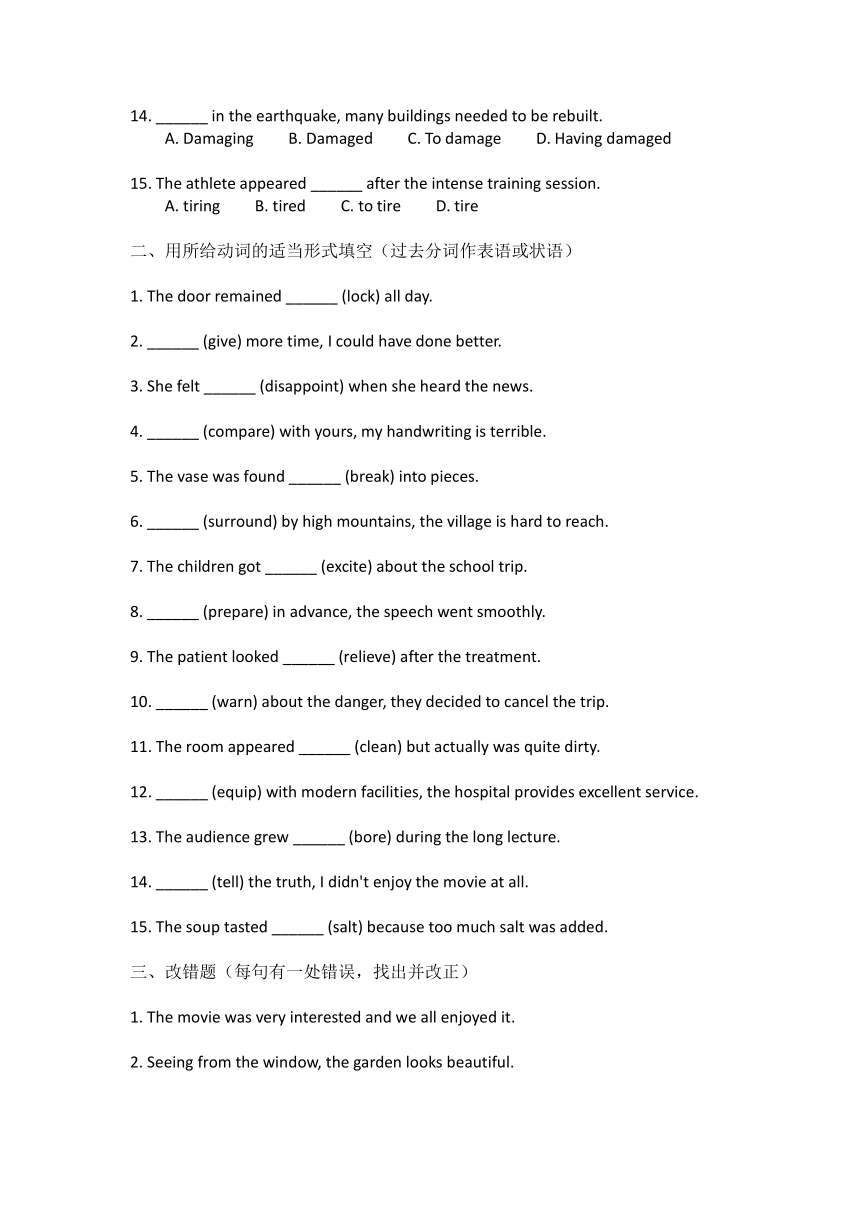Unit 5 Music 过去分词作表语和状语导学案(含答案)-2024-2025学年高中英语人教版(2019)必修第二册
文档属性
| 名称 | Unit 5 Music 过去分词作表语和状语导学案(含答案)-2024-2025学年高中英语人教版(2019)必修第二册 |  | |
| 格式 | docx | ||
| 文件大小 | 25.2KB | ||
| 资源类型 | 教案 | ||
| 版本资源 | 人教版(2019) | ||
| 科目 | 英语 | ||
| 更新时间 | 2025-04-02 11:29:49 | ||
图片预览




文档简介
必修二 Unit 5
语法—过去分词作表语和状语
过去分词的构成:
规则动词的过去分词是在动词词尾加-ed,不规则动词的过去分词有不规则的变化,如know→known, keep→kept, fall→fallen等, 这些不规则变化需要单独记忆。
过去分词作表语(表语:是句子中用来描述或说明主语的身份、性质、状态或特征的成分,通常与系动词一起构成主系表结构。表语属于句子的谓语部分,但本身并不是动词,而是对主语的补充说明。)
过去分词作表语的用法。
当“人”作主语时,用过去分词作表语,表示主语的“状态或思想感情”等。
例如:When we heard of this matter, we were deeply moved. 当听说这件事时,我们被深深地感动了。
He seemed quite delighted at the idea.听到这个想法,他似乎很高兴。
过去分词作表语不要与被动语态混为一体。过去分词作表语表示主语的“状态”,而被动语态则表示被动的“动作”。
例如:My glasses are broken.我的眼镜碎了。(状态)
My glasses were broken by my son.我的眼镜被我儿子摔碎了。(动作)
I was greatly surprised by a knock at the door.敲门声使我大为吃惊。(状态)
On the earth,70% of the surface is covered with water. 地球表面70%被水覆盖。(动作)
现在分词和过去分词作表语的区别。(现在分词:是动词的一种非谓语形式,由动词原形+-ing构成,表示主动、进行的动作。也用于进行时态。过去分词:是动词的一种非谓语形式,规则动词由动词原形+-ed构成,表被动、完成的动作。也用于完成时态和被动语态。)
现在分词作表语,表示的动作与句子的主语之间构成逻辑上的主谓关系;而过去分词作表语,其表示的动作与句子的主语之间构成逻辑上的动宾关系。有此用法的常见词:exciting, excited; interesting, interested; disappointing, disappointed; shocking, shocked; astonishing, astonished; surprising, surprised; satisfying, satisfied; confusing, confused; puzzling, puzzled; boring, bored; tiring, tired; frightening, frightened; amazing, amazed等。
例如:The news was exciting and we were all excited.这个消息令人兴奋,我们都很激动。
We were surprised at the surprising result.我们对这个惊人的结果感到惊讶。
过去分词(短语)作状语。(状语是句子中修饰动词、形容词、副词或整个句子的成分,用于说明动作发生的时间、地点、原因、方式、程度、目的、条件等。注意状语不是句子的主干部分。)
过去分词(短语)作状语可以表示时间、原因、条件、让步、方式或伴随情况等,它的逻辑主语通常就是句子的主语,过去分词与主语之间是逻辑上的动宾关系。
作时间状语。
例如:When completed, the canal will connect the river with the lake. 运河建成以后,它将把江和湖连接起来。
作原因状语。
例如:Lost in deep thought, I didn't notice what was happening outside.(Lost in deep thought=Because I was lost in deep thought)由于陷入沉思,我没注意到外面正在发生什么事情。
作条件状语。
例如:Given another hour, I can also work out this problem.(Given another hour=If I am given another hour)如果再给我一个小时,我也能把这道题算出来。
作让步状语。
例如:Beaten by the opposite team, we didn't lose heart and encouraged each other.(Beaten by the opposite team=Though we were beaten by the opposite team)虽然被对方的队打败了,但我们并没有灰心,而是相互鼓励。
作方式或伴随状语。
如:The old man got on the bus,supported by a girl.(supported by a girl作方式状语)在一位姑娘的搀扶下,老人上了公共汽车。
现在分词和过去分词作状语的区别。
过去分词与句子的主语之间存在逻辑上的动宾关系,即表被动;现在分词与句子的主语之间存在逻辑上的主谓关系,即表主动。
例如:Asked why he was late, he cried.被问到为什么迟到时,他哭了。
Looking out of the window, I saw some students playing there.朝窗外望去,我看见一些学生在那边玩耍。
注意:
(1)过去分词(短语)作状语时,其前面可以带有相应的连词,如when, though, although, as if, as though, if, unless, until, once等,表时间、让步、条件、方式等。例如:If invited,I will attend my friend's wedding.如果受到邀请,我会参加我朋友的 婚礼
过去分词(短语)作状语时,分词的逻辑主语与句子的主语要一致。
例如:If caught,the thief will be punished by the police.如果被抓,小偷会受到警方的处罚。
有些过去分词已形容词化,作状语时表示人的状态。常见的有:satisfied, surprised, interested, moved, worried, pleased, disappointed等。
例如:Disappointed at the examination results,the girl stood there without saying a word. 因为对考试结果很失望,这个女孩站在那儿一句话也没说。
练习
一、单项选择
1. The audience were deeply ______ by the moving performance last night.
A. moved B. moving C. to move D. move
2. ______ in the accident, the driver was sent to hospital immediately.
A. Injured B. Injuring C. To injure D. Having injured
3. The window was found ______ when we arrived home.
A. breaking B. broken C. to break D. break
4. ______ by what he had seen, the boy couldn't sleep all night.
A. Troubled B. Troubling C. To trouble D. Having troubled
5. The project, ______ ahead of schedule, was highly praised by the manager.
A. completing B. completed C. to complete D. being completed
6. ______ in his research, the scientist didn't notice the time passing by.
A. Absorbed B. Absorbing C. To absorb D. Having absorbed
7. The children looked ______ after playing in the snow for hours.
A. exhausting B. exhausted C. to exhaust D. exhaust
8. ______ from the top of the mountain, the whole city looks magnificent.
A. Seen B. Seeing C. To see D. Having seen
9. The news was so ______ that everyone in the room fell silent.
A. shocked B. shocking C. to shock D. shock
10. ______ with care, the fragile package arrived safely.
A. Handling B. Handled C. Handled D. To handle
11. The students seemed ______ about the upcoming exam.
A. worrying B. worried C. to worry D. worry
12. ______ by the sudden noise, the baby started crying.
A. Frightened B. Frightening C. To frighten D. Having frightened
13. The instructions were clearly ______ on the label.
A. printing B. printed C. to print D. print
14. ______ in the earthquake, many buildings needed to be rebuilt.
A. Damaging B. Damaged C. To damage D. Having damaged
15. The athlete appeared ______ after the intense training session.
A. tiring B. tired C. to tire D. tire
二、用所给动词的适当形式填空(过去分词作表语或状语)
1. The door remained ______ (lock) all day.
2. ______ (give) more time, I could have done better.
3. She felt ______ (disappoint) when she heard the news.
4. ______ (compare) with yours, my handwriting is terrible.
5. The vase was found ______ (break) into pieces.
6. ______ (surround) by high mountains, the village is hard to reach.
7. The children got ______ (excite) about the school trip.
8. ______ (prepare) in advance, the speech went smoothly.
9. The patient looked ______ (relieve) after the treatment.
10. ______ (warn) about the danger, they decided to cancel the trip.
11. The room appeared ______ (clean) but actually was quite dirty.
12. ______ (equip) with modern facilities, the hospital provides excellent service.
13. The audience grew ______ (bore) during the long lecture.
14. ______ (tell) the truth, I didn't enjoy the movie at all.
15. The soup tasted ______ (salt) because too much salt was added.
三、改错题(每句有一处错误,找出并改正)
1. The movie was very interested and we all enjoyed it.
2. Seeing from the window, the garden looks beautiful.
3. The teacher seemed satisfying with our performance.
4. Born in a poor family, his childhood was very difficult.
5. The glass was breaking when it fell on the floor.
6. The problem appeared solved at yesterday's meeting.
7. Given enough time, the task can be completing successfully.
8. The travelers felt tiring after the long journey.
9. The book was writing in simple English for beginners.
10. Heard the news, she burst into tears.
四、句子改写(用过去分词短语改写句子)
1. Because he was encouraged by his teacher, he worked harder.
2. When it is seen from space, the earth looks blue.
3. As I was exhausted after work, I went straight to bed.
4. Because they were surprised by the noise, they stopped talking.
5. After the vase was broken by the cat, it couldn't be repaired.
6. Because she was educated abroad, she speaks excellent English.
7. When the novel is translated into English, it becomes very popular.
8. As the road was blocked by snow, we had to turn back.
9. Because I was confused by the instructions, I asked for help.
10. When the museum is viewed at night, it looks especially beautiful.
五、翻译句子(使用过去分词作表语或状语)
1. 由于受到污染,这条河里的鱼都死了。
2. 从山顶看,整个城市尽收眼底。
3. 听到这个消息,他显得很惊讶。
4. 如果给予更多关注,这个问题本可以避免。
5. 由于被大雨淋湿,他感冒了。
6. 与其他学生相比,他的进步很快。
7. 这个谜题看似简单,实则复杂。
8. 由于准备充分,她对考试很有信心。
9. 这些苹果尝起来有点酸。
10. 由于被困在电梯里两小时,他们错过了会议。
参考答案
一、单项选择
1-5: AABAB
6-10: ABABC
11-15: BABBB
二、用所给动词的适当形式填空
1. locked
2. Given
3. disappointed
4. Compared
5. broken
6. Surrounded
7. excited
8. Prepared
9. relieved
10. Warned
11. cleaned
12. Equipped
13. bored
14. Told
15. salted
三、改错题
1. interested → interesting
2. Seeing → Seen
3. satisfying → satisfied
4. Born → Being born (或改为: Born in a poor family, he had a very difficult childhood.)
5. breaking → broken
6. appeared solved → appeared to be solved
7. completing → completed
8. tiring → tired
9. writing → written
10. Heard → Hearing
四、句子改写
1. Encouraged by his teacher, he worked harder.
2. Seen from space, the earth looks blue.
3. Exhausted after work, I went straight to bed.
4. Surprised by the noise, they stopped talking.
5. Broken by the cat, the vase couldn't be repaired.
6. Educated abroad, she speaks excellent English.
7. Translated into English, the novel becomes very popular.
8. Blocked by snow, the road forced us to turn back.
9. Confused by the instructions, I asked for help.
10. Viewed at night, the museum looks especially beautiful.
五、翻译句子
1. Polluted, the river had all its fish dead.
2. Seen from the top of the mountain, the whole city comes into view.
3. He seemed surprised at the news.
4. Given more attention, the problem could have been avoided.
5. Caught in the heavy rain, he caught a cold.
6. Compared with other students, he made rapid progress.
7. The puzzle appears simple but is actually complicated.
8. Well prepared, she was confident about the exam.
9. These apples taste a bit sour.
10. Trapped in the elevator for two hours, they missed the meeting.
语法—过去分词作表语和状语
过去分词的构成:
规则动词的过去分词是在动词词尾加-ed,不规则动词的过去分词有不规则的变化,如know→known, keep→kept, fall→fallen等, 这些不规则变化需要单独记忆。
过去分词作表语(表语:是句子中用来描述或说明主语的身份、性质、状态或特征的成分,通常与系动词一起构成主系表结构。表语属于句子的谓语部分,但本身并不是动词,而是对主语的补充说明。)
过去分词作表语的用法。
当“人”作主语时,用过去分词作表语,表示主语的“状态或思想感情”等。
例如:When we heard of this matter, we were deeply moved. 当听说这件事时,我们被深深地感动了。
He seemed quite delighted at the idea.听到这个想法,他似乎很高兴。
过去分词作表语不要与被动语态混为一体。过去分词作表语表示主语的“状态”,而被动语态则表示被动的“动作”。
例如:My glasses are broken.我的眼镜碎了。(状态)
My glasses were broken by my son.我的眼镜被我儿子摔碎了。(动作)
I was greatly surprised by a knock at the door.敲门声使我大为吃惊。(状态)
On the earth,70% of the surface is covered with water. 地球表面70%被水覆盖。(动作)
现在分词和过去分词作表语的区别。(现在分词:是动词的一种非谓语形式,由动词原形+-ing构成,表示主动、进行的动作。也用于进行时态。过去分词:是动词的一种非谓语形式,规则动词由动词原形+-ed构成,表被动、完成的动作。也用于完成时态和被动语态。)
现在分词作表语,表示的动作与句子的主语之间构成逻辑上的主谓关系;而过去分词作表语,其表示的动作与句子的主语之间构成逻辑上的动宾关系。有此用法的常见词:exciting, excited; interesting, interested; disappointing, disappointed; shocking, shocked; astonishing, astonished; surprising, surprised; satisfying, satisfied; confusing, confused; puzzling, puzzled; boring, bored; tiring, tired; frightening, frightened; amazing, amazed等。
例如:The news was exciting and we were all excited.这个消息令人兴奋,我们都很激动。
We were surprised at the surprising result.我们对这个惊人的结果感到惊讶。
过去分词(短语)作状语。(状语是句子中修饰动词、形容词、副词或整个句子的成分,用于说明动作发生的时间、地点、原因、方式、程度、目的、条件等。注意状语不是句子的主干部分。)
过去分词(短语)作状语可以表示时间、原因、条件、让步、方式或伴随情况等,它的逻辑主语通常就是句子的主语,过去分词与主语之间是逻辑上的动宾关系。
作时间状语。
例如:When completed, the canal will connect the river with the lake. 运河建成以后,它将把江和湖连接起来。
作原因状语。
例如:Lost in deep thought, I didn't notice what was happening outside.(Lost in deep thought=Because I was lost in deep thought)由于陷入沉思,我没注意到外面正在发生什么事情。
作条件状语。
例如:Given another hour, I can also work out this problem.(Given another hour=If I am given another hour)如果再给我一个小时,我也能把这道题算出来。
作让步状语。
例如:Beaten by the opposite team, we didn't lose heart and encouraged each other.(Beaten by the opposite team=Though we were beaten by the opposite team)虽然被对方的队打败了,但我们并没有灰心,而是相互鼓励。
作方式或伴随状语。
如:The old man got on the bus,supported by a girl.(supported by a girl作方式状语)在一位姑娘的搀扶下,老人上了公共汽车。
现在分词和过去分词作状语的区别。
过去分词与句子的主语之间存在逻辑上的动宾关系,即表被动;现在分词与句子的主语之间存在逻辑上的主谓关系,即表主动。
例如:Asked why he was late, he cried.被问到为什么迟到时,他哭了。
Looking out of the window, I saw some students playing there.朝窗外望去,我看见一些学生在那边玩耍。
注意:
(1)过去分词(短语)作状语时,其前面可以带有相应的连词,如when, though, although, as if, as though, if, unless, until, once等,表时间、让步、条件、方式等。例如:If invited,I will attend my friend's wedding.如果受到邀请,我会参加我朋友的 婚礼
过去分词(短语)作状语时,分词的逻辑主语与句子的主语要一致。
例如:If caught,the thief will be punished by the police.如果被抓,小偷会受到警方的处罚。
有些过去分词已形容词化,作状语时表示人的状态。常见的有:satisfied, surprised, interested, moved, worried, pleased, disappointed等。
例如:Disappointed at the examination results,the girl stood there without saying a word. 因为对考试结果很失望,这个女孩站在那儿一句话也没说。
练习
一、单项选择
1. The audience were deeply ______ by the moving performance last night.
A. moved B. moving C. to move D. move
2. ______ in the accident, the driver was sent to hospital immediately.
A. Injured B. Injuring C. To injure D. Having injured
3. The window was found ______ when we arrived home.
A. breaking B. broken C. to break D. break
4. ______ by what he had seen, the boy couldn't sleep all night.
A. Troubled B. Troubling C. To trouble D. Having troubled
5. The project, ______ ahead of schedule, was highly praised by the manager.
A. completing B. completed C. to complete D. being completed
6. ______ in his research, the scientist didn't notice the time passing by.
A. Absorbed B. Absorbing C. To absorb D. Having absorbed
7. The children looked ______ after playing in the snow for hours.
A. exhausting B. exhausted C. to exhaust D. exhaust
8. ______ from the top of the mountain, the whole city looks magnificent.
A. Seen B. Seeing C. To see D. Having seen
9. The news was so ______ that everyone in the room fell silent.
A. shocked B. shocking C. to shock D. shock
10. ______ with care, the fragile package arrived safely.
A. Handling B. Handled C. Handled D. To handle
11. The students seemed ______ about the upcoming exam.
A. worrying B. worried C. to worry D. worry
12. ______ by the sudden noise, the baby started crying.
A. Frightened B. Frightening C. To frighten D. Having frightened
13. The instructions were clearly ______ on the label.
A. printing B. printed C. to print D. print
14. ______ in the earthquake, many buildings needed to be rebuilt.
A. Damaging B. Damaged C. To damage D. Having damaged
15. The athlete appeared ______ after the intense training session.
A. tiring B. tired C. to tire D. tire
二、用所给动词的适当形式填空(过去分词作表语或状语)
1. The door remained ______ (lock) all day.
2. ______ (give) more time, I could have done better.
3. She felt ______ (disappoint) when she heard the news.
4. ______ (compare) with yours, my handwriting is terrible.
5. The vase was found ______ (break) into pieces.
6. ______ (surround) by high mountains, the village is hard to reach.
7. The children got ______ (excite) about the school trip.
8. ______ (prepare) in advance, the speech went smoothly.
9. The patient looked ______ (relieve) after the treatment.
10. ______ (warn) about the danger, they decided to cancel the trip.
11. The room appeared ______ (clean) but actually was quite dirty.
12. ______ (equip) with modern facilities, the hospital provides excellent service.
13. The audience grew ______ (bore) during the long lecture.
14. ______ (tell) the truth, I didn't enjoy the movie at all.
15. The soup tasted ______ (salt) because too much salt was added.
三、改错题(每句有一处错误,找出并改正)
1. The movie was very interested and we all enjoyed it.
2. Seeing from the window, the garden looks beautiful.
3. The teacher seemed satisfying with our performance.
4. Born in a poor family, his childhood was very difficult.
5. The glass was breaking when it fell on the floor.
6. The problem appeared solved at yesterday's meeting.
7. Given enough time, the task can be completing successfully.
8. The travelers felt tiring after the long journey.
9. The book was writing in simple English for beginners.
10. Heard the news, she burst into tears.
四、句子改写(用过去分词短语改写句子)
1. Because he was encouraged by his teacher, he worked harder.
2. When it is seen from space, the earth looks blue.
3. As I was exhausted after work, I went straight to bed.
4. Because they were surprised by the noise, they stopped talking.
5. After the vase was broken by the cat, it couldn't be repaired.
6. Because she was educated abroad, she speaks excellent English.
7. When the novel is translated into English, it becomes very popular.
8. As the road was blocked by snow, we had to turn back.
9. Because I was confused by the instructions, I asked for help.
10. When the museum is viewed at night, it looks especially beautiful.
五、翻译句子(使用过去分词作表语或状语)
1. 由于受到污染,这条河里的鱼都死了。
2. 从山顶看,整个城市尽收眼底。
3. 听到这个消息,他显得很惊讶。
4. 如果给予更多关注,这个问题本可以避免。
5. 由于被大雨淋湿,他感冒了。
6. 与其他学生相比,他的进步很快。
7. 这个谜题看似简单,实则复杂。
8. 由于准备充分,她对考试很有信心。
9. 这些苹果尝起来有点酸。
10. 由于被困在电梯里两小时,他们错过了会议。
参考答案
一、单项选择
1-5: AABAB
6-10: ABABC
11-15: BABBB
二、用所给动词的适当形式填空
1. locked
2. Given
3. disappointed
4. Compared
5. broken
6. Surrounded
7. excited
8. Prepared
9. relieved
10. Warned
11. cleaned
12. Equipped
13. bored
14. Told
15. salted
三、改错题
1. interested → interesting
2. Seeing → Seen
3. satisfying → satisfied
4. Born → Being born (或改为: Born in a poor family, he had a very difficult childhood.)
5. breaking → broken
6. appeared solved → appeared to be solved
7. completing → completed
8. tiring → tired
9. writing → written
10. Heard → Hearing
四、句子改写
1. Encouraged by his teacher, he worked harder.
2. Seen from space, the earth looks blue.
3. Exhausted after work, I went straight to bed.
4. Surprised by the noise, they stopped talking.
5. Broken by the cat, the vase couldn't be repaired.
6. Educated abroad, she speaks excellent English.
7. Translated into English, the novel becomes very popular.
8. Blocked by snow, the road forced us to turn back.
9. Confused by the instructions, I asked for help.
10. Viewed at night, the museum looks especially beautiful.
五、翻译句子
1. Polluted, the river had all its fish dead.
2. Seen from the top of the mountain, the whole city comes into view.
3. He seemed surprised at the news.
4. Given more attention, the problem could have been avoided.
5. Caught in the heavy rain, he caught a cold.
6. Compared with other students, he made rapid progress.
7. The puzzle appears simple but is actually complicated.
8. Well prepared, she was confident about the exam.
9. These apples taste a bit sour.
10. Trapped in the elevator for two hours, they missed the meeting.
